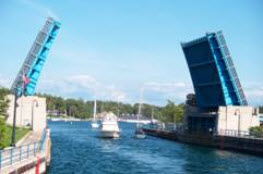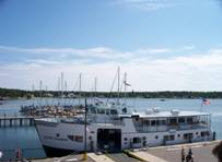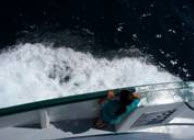Fishing and boating accidents result in thousands of injuries each year. The U.S. Coast Guard reported 3331 injuries and 709 fatalities due to boating accidents on both recreational and commercial vessels. There are many causes for these accidents, including collisions with objects or other vessels, drowning, electrical and mechanical failures, interaction with unguarded machinery, and others. There are various acts and laws that govern accidents at sea. This issue of Forensic Clues will examine some of the preventable accidents caused by defective machinery and equipment that occur at sea, and a brief overview of the laws and regulations affecting product liability litigation related to maritime accidents.

Boating accidents often involve defective or poorly maintained equipment
Unguarded Mechanical Hazards
Mechanical hazards exist on boats as they do in other industries, although lack of code enforcement can result in multitudes of unguarded machinery. Many of these unguarded mechanical hazards would never exist on land, due to OSHA regulations and inspections.
Unguarded winches and conveyors result in numerous accidents. These devices must be safeguarded to ensure that workers do not become entangled in these types of machinery with the potential for serious injury or death.
OSHA does have requirements specific to maritime environments. 29CFR1917.47 calls for guarding moving winch parts, entanglement hazards, and other hazardous aspects of winches. Section 48 of this standard calls for the guarding of entanglement hazards of conveyors, as well as lockout/tagout procedures. 29CFR1917.151(b)(1) states "Danger zones on machines and equipment used by employees shall be guarded." Like all OSHA standards, these standards require employers to provide a safe working environment, and hold the employer responsible for safety violations. This is true even if a piece of machinery is defectively designed, the employer can still be held liable.
This is the same struggle and lack of accountability that is found in many different industries with different types of hazardous machinery. OSHA jurisdiction only goes three miles from shore, and if a regulation by another Federal agency is in place, such as the U.S. Coast Guard, these will take precedent. The USCG does have some machine guarding requirements, but these are rarely enforced, which cripples the OSHA standards even further. The American Society of Mechanical Engineers and others produce standards that cover guarding of hazards that are found on boats, but these standards are not mandatory and are often ignored by manufacturers. Simple physical barrier guarding can solve many mechanical hazards. Other equipment may require more creative guarding techniques to maintain productivity and ensure the guards are not removed or bypassed. Emergency stop systems easily accessible to machine operators and within reach of the hazardous areas of machinery can help minimize injury when someone does become entangled in a winch system. The simple concept of an emergency stop system for boat equipment is slowly being implemented. The European solution to difficult to guard deck winches is the elimination of the device altogether. Once again, Europe has further advanced their safety requirements beyond what the United States requires.
Other unguarded mechanical hazards can include bait chopping machines, crab pot launchers, and processing equipment found on factory trawlers.
Hydraulic System Failure
Hydraulic systems can fail, and if they are not designed to be failsafe, accidents can occur from falling objects, or loss of control of hydraulically controlled vessels. Simple precautions by manufacturers of these hydraulic components will minimize the impact of hydraulic pressure failure.
Cable Failure
Another common accident involves cable failure. Cables that are stretched taut can hold an extreme amount of potential energy. If the cable comes lose, or breaks, this potential energy is released, causing the cable to accelerate and whip about dangerously. Anyone who is struck by a high load broken cable will likely receive serious injuries or die. Cable failure can occur due to simple overloading of the cable, material defects in the cable, by dynamic loading of the cable, and other factors including a weakened cable and cable handling. Inspection of the broken cable may reveal the cause of the accident.

Maintenance Issues
Some maritime accidents occur due to failure caused by inadequate maintenance. It is important to be able to identify whether a failure was due to a product defect of some sort, or because of improper maintenance, or due to improper rigging.
Falling Overboard
People fall overboard on both commercial and recreational vessels. Some of these accidents are due to violent weather, while others are the result of the failure of railing and gates on ships, or other safety devices.

Other Accidents
There are countless ways to get injured at sea, including getting crushed by crab pots, limb amputation due to cinching cables, and structural failures of boat components.
Maritime Law
There are unique laws that address maritime accidents. The Death on the High Seas Act allows family of workers killed at sea to recover future wages of the decedent. The Jones Act allows injured workers to file a suit if they are injured due to an unsafe condition of the ship, or negligence of the employer or crew. General maritime law is the combination of laws, regulations, and rulings developed over hundreds of years. General maritime law can be used for claims against third parties, and is based on a strict liability standard.
Safety Engineering Resources has extensive experience working with machine guarding accident cases. Give us a call today at (855) 627-6273 to discuss what we can do for you.
Please call us to discuss any questions you have about unsafe products. (855) 627-6273













